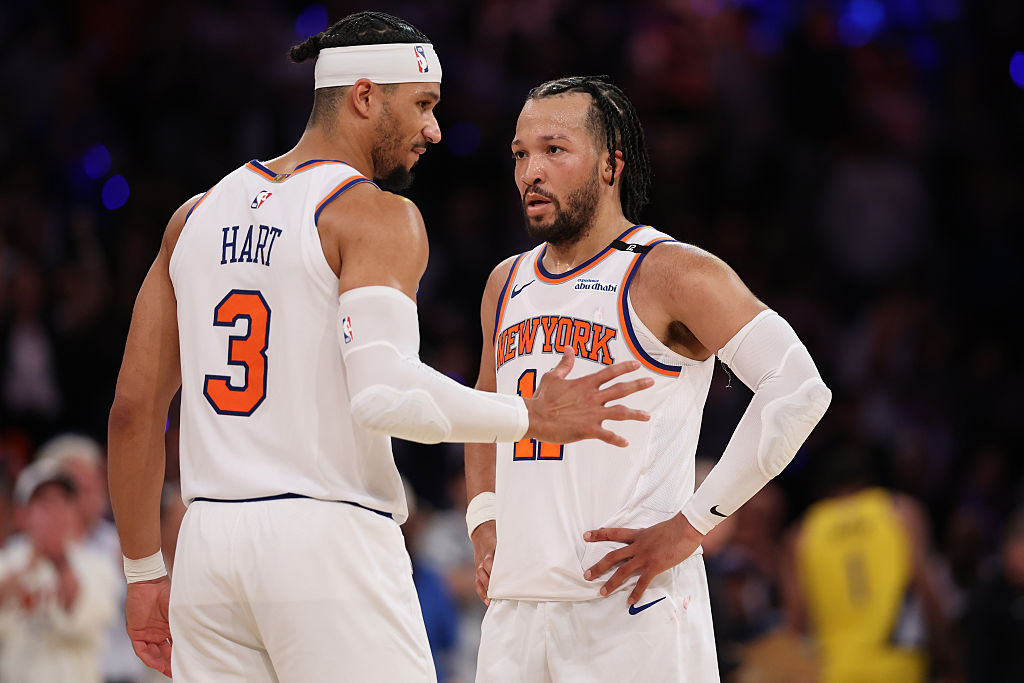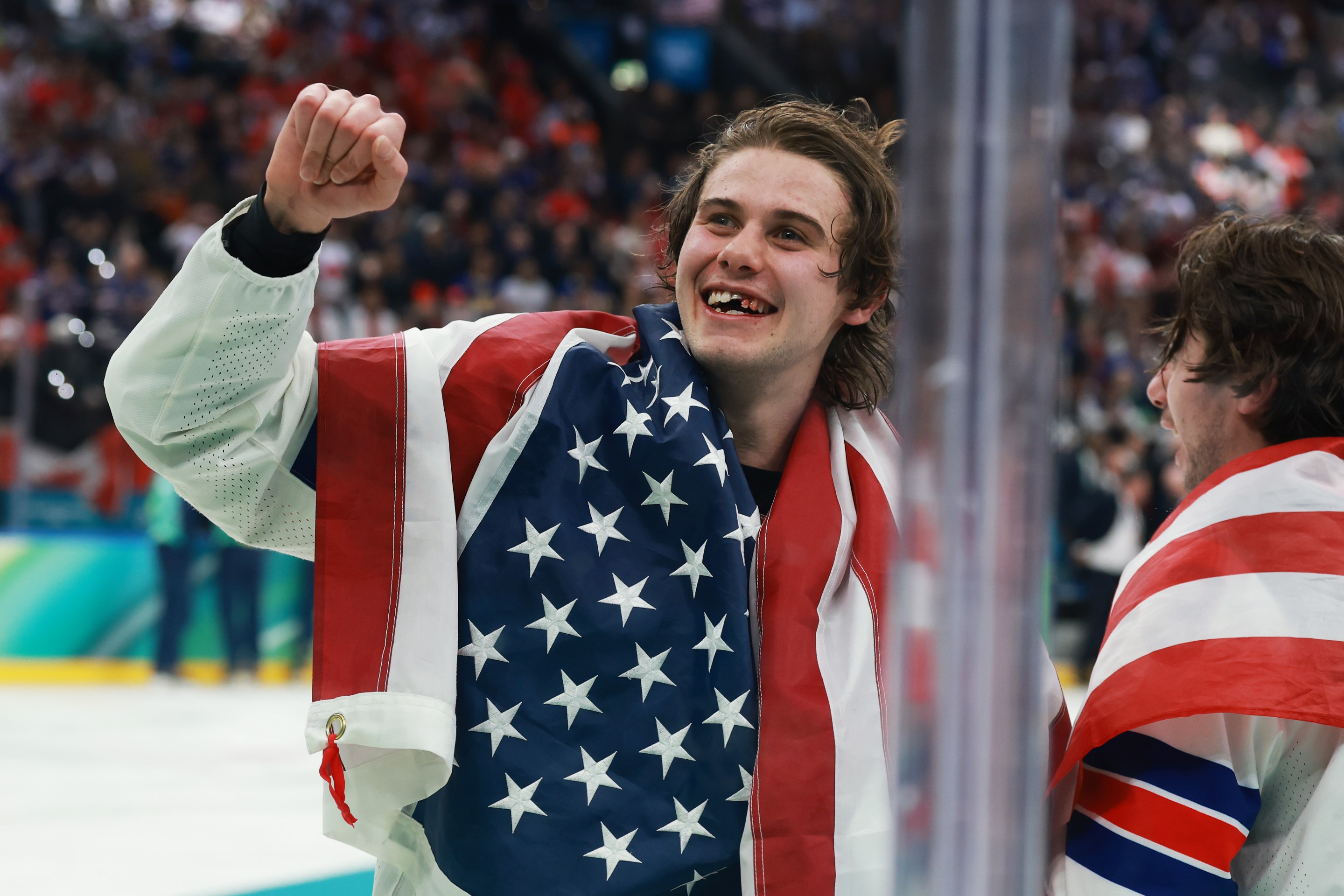I wasn't sure what to expect when I started listening to Roommates, the gambling-sponsored podcast hosted by New York Knicks Jalen Brunson and Josh Hart. My familiarity with the two is recently acquired—a friend introduced me to them and their fellow Villanova alumni Mikal Bridges and Donte DiVincenzo back during the headiest days of the "Nova Knicks" phenomenon, before DiVincenzo was traded to the Minnesota Timberwolves for Karl-Anthony Towns. Admittedly, my interest waned once the quartet became a trio. But that was before the Knicks entered the playoffs and New York City exploded.
Seemingly overnight, the city was covered in blue and orange. Suddenly, I couldn't go to the gym without someone uttering phrases that might as well have been code: pick-and-roll, bing bong, double overtime, Reggie Miller. If I'm being honest, it wasn't until the Knicks started their third playoff series against the Pacers that I finally understood that Game 5 is actually closer to Game 20 for these players. But by the time my older brother told me he was planning to come to New York if the Knicks won the whole thing, my curiosity had officially been piqued.
So I did something I'd never done before: I watched an entire NBA game by myself. And then I watched another. And another. I watched until the Knicks lost 125-108 in Game 6 and New York wept. I'm technically still watching the Finals now, but with far less interest than I was before.
It's been an era of discovery. I've found out how enjoyable watching sports can be without the additional distraction of my dad and two brothers talking over the game. I've been introduced to the baby-faced phenomenon that is Tyrese Haliburton and the particular, peculiar grace of KAT; the New Yorker's Vinson Cunningham described Towns as possessing "the posture and the sulking body language of a middle-school kid halfway through a startled reckoning with his strange new body."
But most importantly, for this blog at least, I've rediscovered Jalen Brunson and Josh Hart. In their rare moments of stillness on the court, I was struck by how good-natured they seemed. It was a snap judgement, most likely informed by the image still retained in my brain of the two of them smiling on FaceTime with Bridges and DiVincenzo. And frankly, I expected that snap judgment to be neutralized within a few games. My primary associations with professional athletes aren't necessarily positive. But by the time the Knicks left the playoffs, I was still fascinated enough by Brunson and Hart to do yet another thing I've never done before: listen to a podcast hosted by three heterosexual men.
The Roommates podcast consists of the two Knicks and token normie Matt Hillman. From what I can tell, it's a prototypical podcast hosted by professional athletes. For one, it's evident that the sponsorship money isn't going toward production value. The studio is professional enough that when Ben Stiller guested last year, he commented on how nice the lights were, but the living-room-with-microphones set-up is familiar to anyone who's been online in the last two years. Additionally, the podcast clearly isn't invested in editing. There are dead spaces and awkward pauses and entire exchanges that any seasoned producer with the purview to do so would've cut.
Brunson and Hart aren't exactly helped by the lack of editorial oversight. They're not natural interviewers or even on-mic conversationalists. If the goal is "unfiltered," then it's certainly been met. The two are at their best when their guest does double duty as a sort of avuncular interlocutor—the episodes with Stiller and Keegan-Michael Key are both highlights. This kind of relaxed, spontaneous formula is often a recipe for disaster. Very few professional podcast hosts can talk for 90 minutes without saying something that probably shouldn't be aired, let alone athletes doing it as a side gig. So when I started Roommates, I expected the admiration I had for Hart and Brunson's good natures to be swiftly undercut.
Roommates is heavy with young-male conversational patterns. There's a constant stream of references mixed with quick, easily tossed-aside debates that feature granular and inane specifics. In one episode, Brunson, Hart, and Hillman reference the Marvel Cinematic Universe, Game of Thrones, Star Wars, Harry Potter, The Rise of the Planet of the Apes, and the Fast and Furious franchise. There are moments that might veer into emotional territory—in that aforementioned episode, Hart gets this gentle smile on his face when he recalls how many of his childhood memories revolve around playing video games—but these are then immediately undercut by a teasing joke or another pointless debate.
The key word here, to my imagination, is gentle. Even when Brunson gets quietly heated, as he did when arguing the artistic merits of Robert Pattinson's Batman with Jersey Shore's Vinny Guadagnino, he still maintains an easygoing air, as does Hart. It's incongruous with the assured intensity of their movements on the court. Cunningham described Brunson as possessing a "broad, cosmopolitan vocabulary of offensive moves," but in Roommates, that vocabulary shrinks down to a soothingly laconic simplicity.
The most popular podcasts hosted by men aren't exactly a credit to the form—or the gender. Hosts like Theo Von and Joe Rogan have so effectively poisoned the minds of their audiences that one of the most pressing questions for the future of our information ecosystem is how to engineer a leftist antidote. (One possible conclusion: Hasan Piker can never stop streaming.) Even podcasts whose male hosts' whereabouts on Jan. 6 isn't actively in question tend to be vectors of casual misogyny, so much so that the question "Do you listen to podcasts?" is used as way to test men on Love Island.
In listening to Roommates, on the other hand, I understood an argument that my colleague David Roth clued me into: that these two basketball players are corny. Despite the fact that we're agemates, I have this urge to describe them as good kids. Listening to Brunson and Hart reminds me of listening to AM radio in the car with my dad. Part of that's because it's just soft, friendly background patter. But after hours of listening, I think it might also reflect how these guys are. The genre that Brunson and Hart are working in is one that rewards controversy, and fame is a strong inoculation against personal consequences. They could be debating what makes a woman "high value." Instead they spend their time giggling constantly about how bad Hart is at pronouncing names. It's not exactly the left's answer to Joe Rogan, but it's certainly better than I expected.






